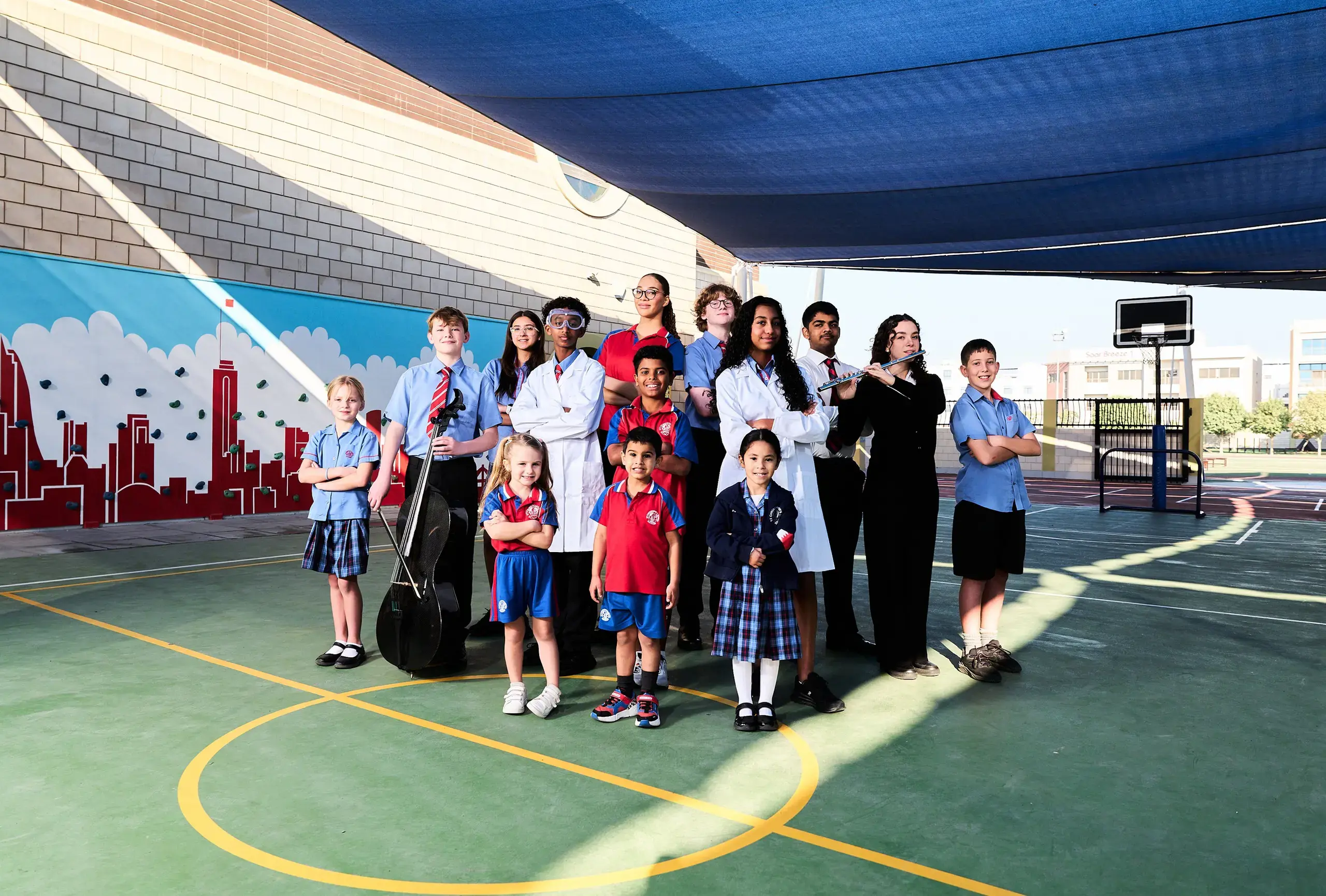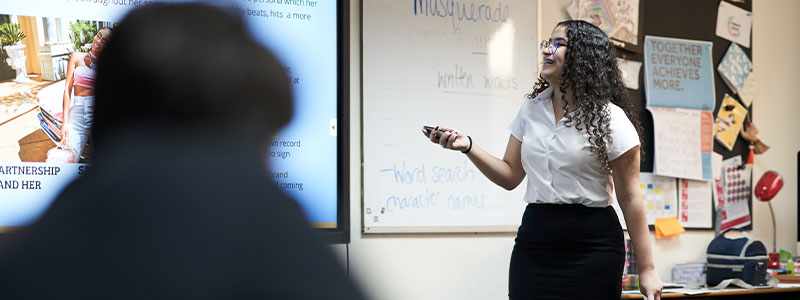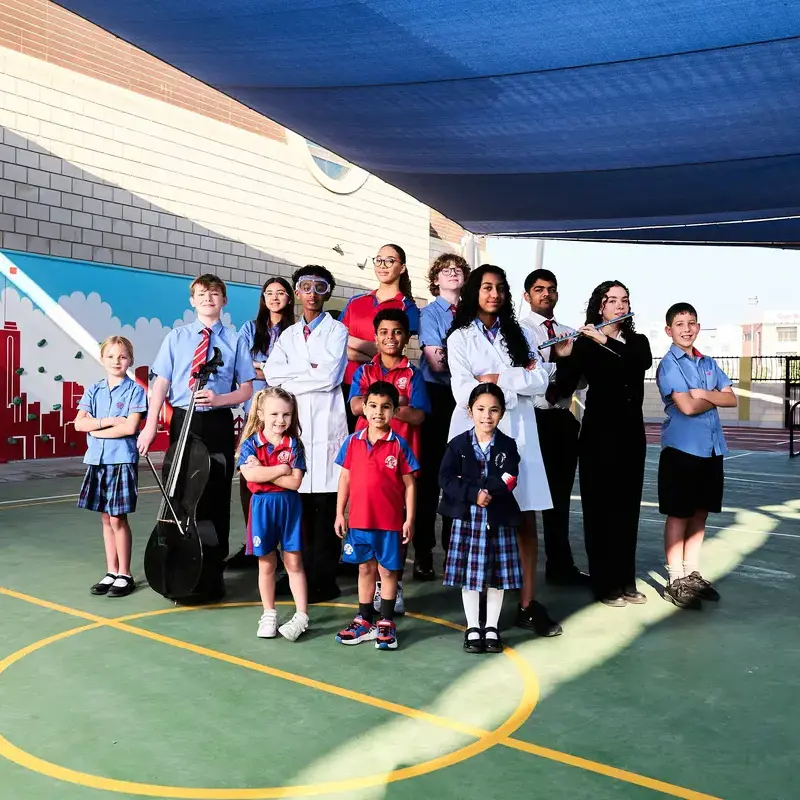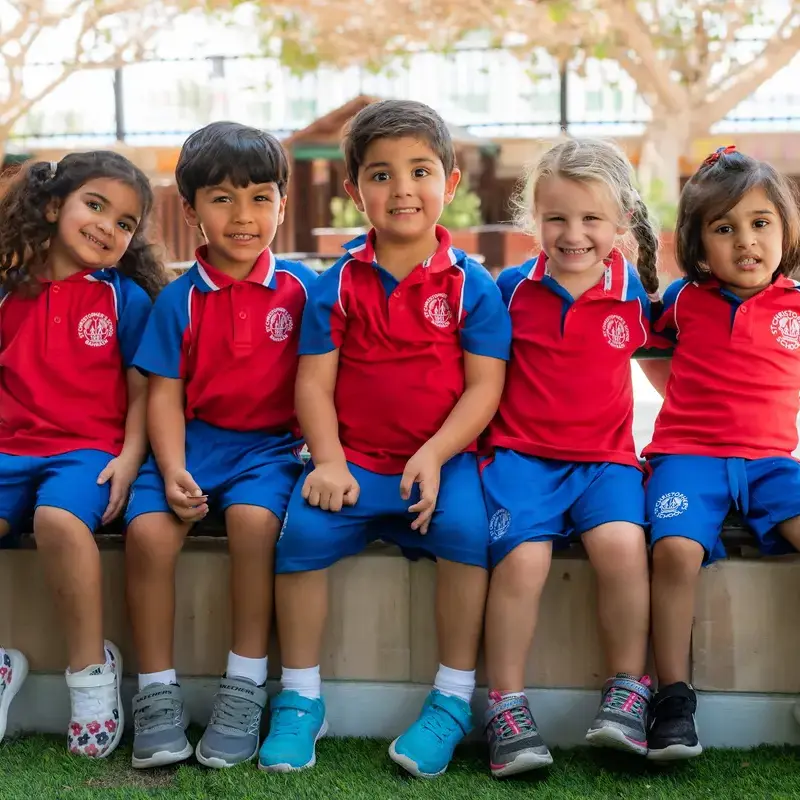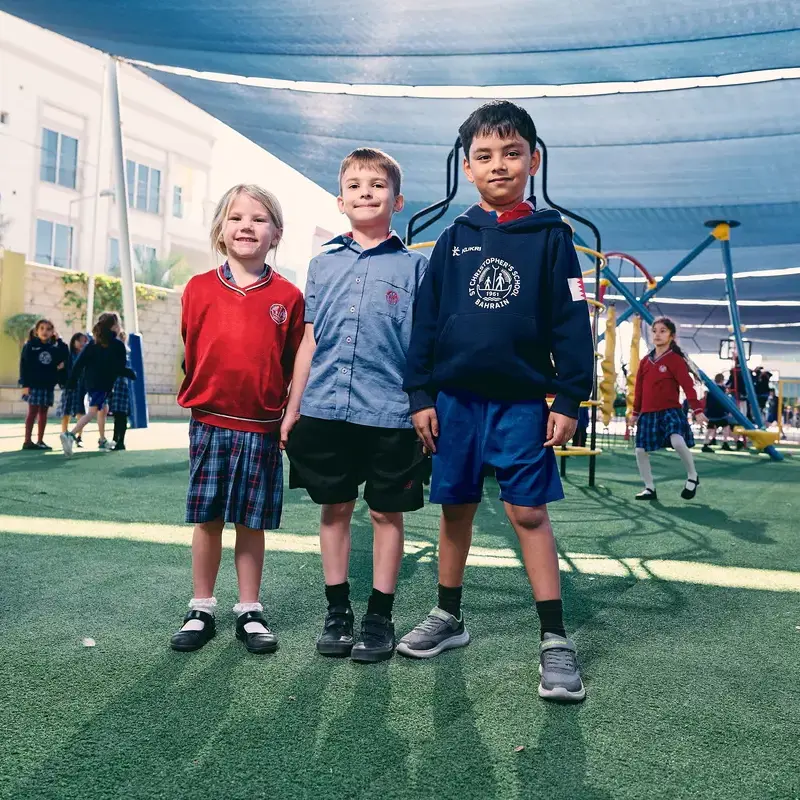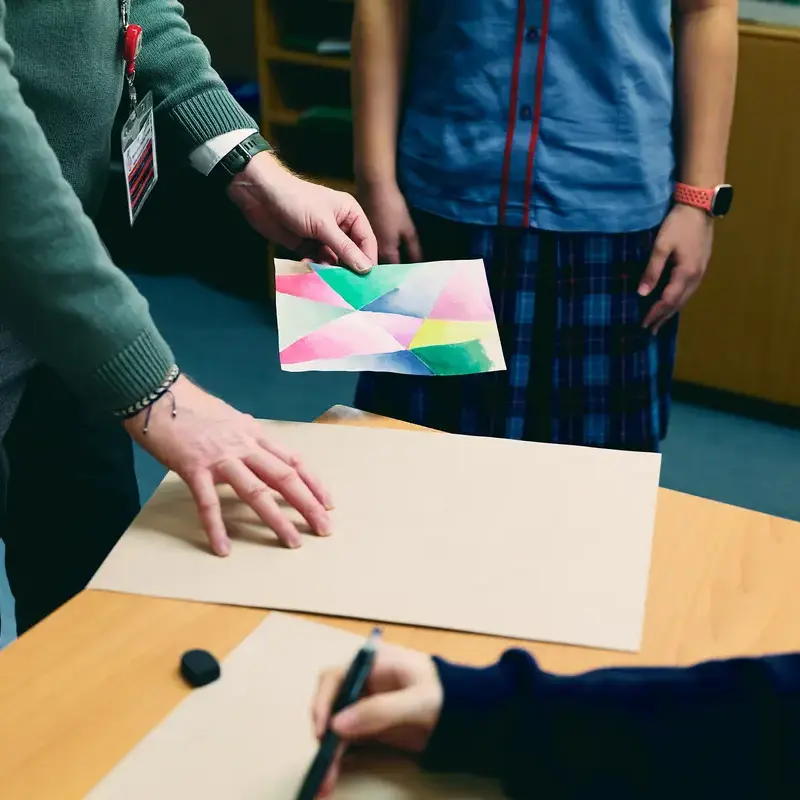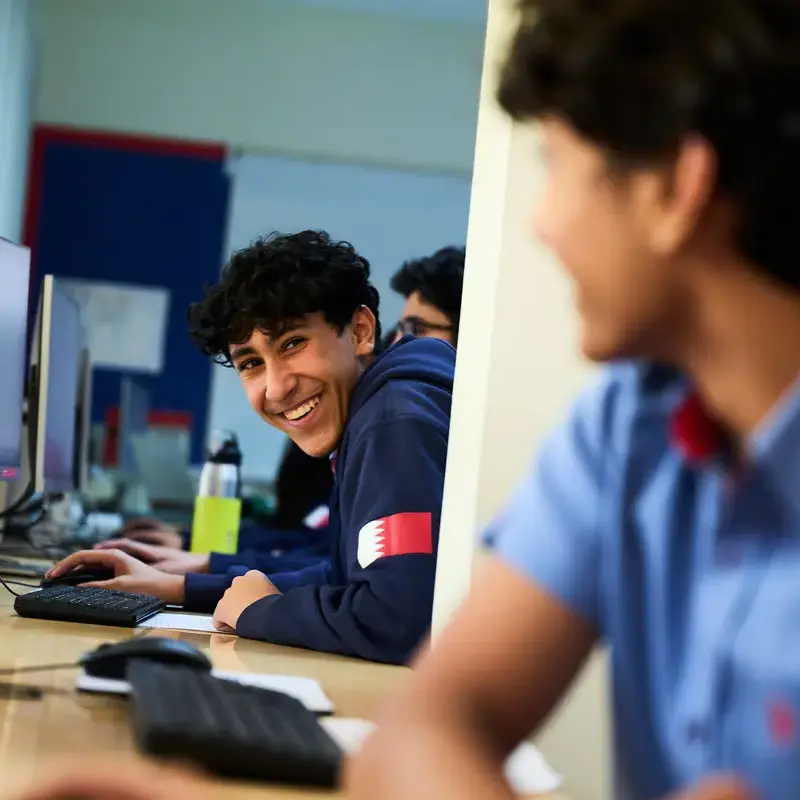Departments
At St Christopher’s Senior School, our students experience a varied, broad, balanced and stimulating curriculum which offers the opportunity for each of them to develop academically, creatively and physically.
Our academic curriculum, our strong pastoral system and our wide-ranging extra-curricular programme, aim to develop students who are Autonomous Learners, Competent Individuals and Global Citizens.
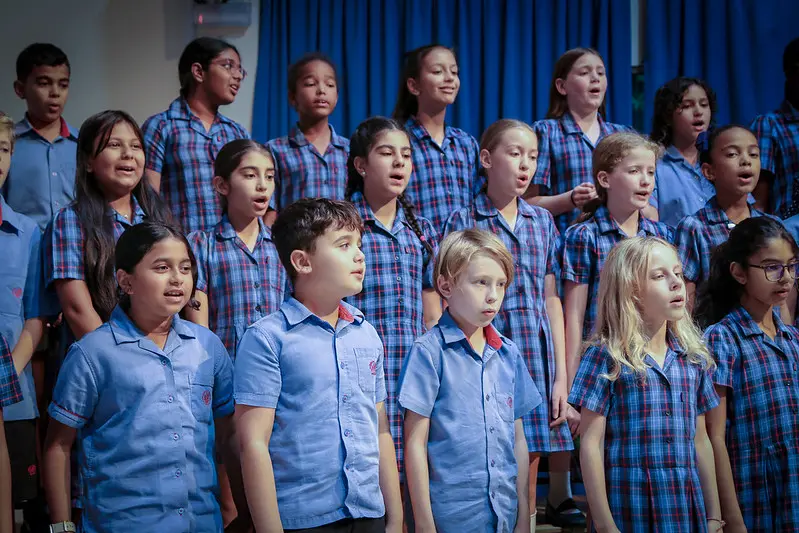
A wide range of subjects is studied by all students in Year 7, 8 and 9 based upon the English National Curriculum, adapted to our local context. As students move into the GCSE years in Years 10 and 11, their subject choice increases. Post-16, we offer the choice for the students to follow either the A-level or the IB Diploma Programme, with a wide range of subjects offered in each.
| Arabic and Islamic Studies |
|---|
|
The Arabic curriculum covers all the language skills that are including:
Through different texts that include informative texts, explanation texts, descriptive texts, narrative texts, guidance texts, persuasive texts, argument texts, and poetry. Non-Arabic StudentsNon-Arabic students have the opportunity to study Arabic as a second language. Topics studied in are aimed towards the GCSE Arabic as a Second Language syllabus, which prepare the students for a variety of skills in the language for communicative purposes. Skills gained include listening, speaking, reading, writing, comprehension and translation. |
| Art |
|
Students are taught in an open plan, well-resourced environment. The artwork is displayed around the school. All forms of Art are equally respected and students work in a wide range of media from:
Annual Exhibitions of the Artwork of examination level students are cultural highlights for the school and the local community. Many students continue to pursue Art related courses at university level.
|
| Business and Economics |
|
You are an important builder of your future in a world governed by changing trends in business, trade, resources, interest rates, and international policy. Studying economics and business, helps you understand the nation's economy and business environment within a global context and gives you a solid understanding of the central role that economic and business thinking plays in all aspects of society. Studying Economics and Business besides broadening your knowledge, you sharpen your skills in critical thinking and effective oral and written communication. The ability to improve problem-solving skills and to evaluate our strengths and weaknesses is integral to our philosophy. We develop many of our student’s skills: decision making and planning, critical understanding of organisations and economies, communication and application of number. As a result, students are well equipped for their next step.
There is a long-standing and consistently strong record of students going on to prestigious universities, and a significant proportion of St Christopher’s students choose to follow a social science degree course. We believe that it is vital to promote interest and enthusiasm for the subject beyond the constraints of the specification, to engender intellectual curiosity and to develop the capacity for independent thought. For example, we take part in Trade Quest, a competition for schools and universities in Bahrain which is operated as a competitive financial simulation and is geared to provide students with realistic experiences simulating the local and international financial markets. The school ranks amongst the highest achievers in the program. |
| Design and Technology |
|
Students are taught the skills to understand and analyse real design problems and to design and realise viable and realistic design solutions for the benefit of others. The subject now encompasses a wide range of skills and techniques that reflect advances in industrial manufacturing such as Computer-Aided Drawing (CAD), Computer-Aided Manufacture (CAM) and the use of smart materials. KS3In KS3, students are given the opportunity to explore a range of ‘design and make’ activities, which encourage them to develop skills and knowledge which better equip them to solve real-life problems and make use of the equipment and facilities on offer. GCSEStudents who then go on to study IGCSE Design and Technology have the choice of specialising in Resistant Materials or Graphic Products. A-Level & IBStudents have further choice on how they want to specialise Post-16. A-level Product Design offers students the chance to develop a broad view of Design and Technology and to really appreciate the relationship between design, materials, manufacture and marketing. It is more product-focused compared to the International Baccalaureate Design course, which takes a more scientific approach to design. |
| Drama |
|
They develop teamwork and co-operation skills – abilities which are vital for every area of school life and beyond. They learn about theatre, develop their creativity and explore ideas and issues through practical work. Thinking creatively and solving problems is an integral part of Drama, and the aim is for these skills to help develop students into thoughtful, well rounded and inventive young adults. In Year 10, IGCSE Drama is a popular option and in the Sixth Form, the pupils can opt for A Level Drama and Theatre. Drama FacilitiesThe Drama department has three spaces: a fully equipped Drama Hall with theatre lighting and sound, and two smaller studio spaces. These areas are used for teaching and the Drama Hall is also used for performances. Extra-CurricularOur extra-curricular drama provision includes a yearly whole school production and smaller KS3 performances. Over recent years these have included performances of:
There are also opportunities to take part in Drama and Dance Clubs. |
| English |
|
St Christopher’s Senior School English Department aims to foster an enjoyment for English language and English literature, as well as developing students’ appreciation of the significance of language and literature in society. Alongside the teaching the British National Curriculum in Years 7-13 as well as the IB Diploma in Years 12 and 13, students explore global perspectives and UN Sustainable Development Goals through a rich and diverse range of literary and non-literary texts.
|
| Geography |
|
The subject is taught in a wide variety of ways, depending on the topic being covered at the time. A wide variety of strategies are used to deliver the topics, ranging from whole-class teaching to small group work. Fieldwork, outside speakers, the internet, GIS and digital tools and resources are used where appropriate to supplement class-based work. Careers OptionsGeography is a stepping stone to a whole range of future opportunities. The skills our students develop will support their further studies and employment. For example, Biology, Geology, Environmental Science, Government & Politics, Economics, Travel & Tourism & Recreation all have close links with much of the material studied in Geography. Employment opportunities where geographical skills will be particularly valued include:
|
| History |
|
Throughout the various History courses on offer at St Christopher's, students of all ages are encouraged to develop their critical thinking skills and to make connections between the available historical evidence. Students will analyse historical episodes from a variety of perspectives and standpoints. These essential life skills enable us to understand the world in which we live and how it has evolved from historical incidents of the past. |
| ICT & Computer Studies |
|
Computational Thinking is a key learning strategy for our students and is a necessary life skill applicable far beyond our curriculum. We strongly believe our students must be equipped with the technical and thinking skills needed to become problem solvers and global citizens who one day may help solve the current and emerging international challenges that face humanity. We are rightly proud of our computing curriculum which not only delivers outstanding examination results, but ensures that each and every student has access to the best possible teaching and learning resources available in order to support their journey in this fascinating subject.
that demand tacit exploration of the unknown and development of imaginative solutions to problems that may not even exist! ICTOur computing curriculum also offers ICT (Information Communication Technology) which enables our students to apply information technology to create products and solutions using a variety of applications. It ensures that our pupils become digitally literate – able to use and express themselves through information and communication technology – at a level suitable for the future workplace and as active participants in a digital world. |
| Mathematics |
|
The Mathematics Department aims to develop independent, determined, exploratory learners in the field of Mathematics whilst, at the same time, making the learning experiences enjoyable, challenging and relevant to each of our students’ needs. Students are provided with opportunities to ask their own questions, create their own solutions, think deeply and refine their ideas through individual and collaborative work. IGCSE & Post 16All students will take Edexcel IGCSE Mathematics, with some students taking Edexcel IGCSE Further Pure Mathematics at the end of Year 11. The school runs Edexcel AS and A level courses, including Further Mathematics, for our Sixth Form students alongside Mathematics: Analysis and Approaches and Mathematics: Applications and Interpretation for our IB students. CompetitionsThe department also encourages all our students to take part in a variety of competitions, providing them with opportunities to pit their wits against students from around the world. Each year, we enter the Junior, Intermediate and Senior Maths Challenge competitions organised by the UK Mathematics Trust achieving excellent results. Many students are then invited to the next rounds such as the Olympiad. In Year 9 we also enter some students for World Class Tests. The Mathematics Department has developed and continues to improve, their own website which contains everything that students and parents need to know, including:
|
| Media Studies |
|
Media Studies is taught by a passionate team, as part of the English Faculty. We are all united by our passion for the media and are dedicated to ensuring the best educational experience and outcomes for our students. Media studies inspire students, encouraging them to respond to the challenge of the subject with confidence and enthusiasm. Media Studies is studied at KS5 and through extracurricular opportunities at KS3 upwards; providing students with the opportunity to develop their practical media production skills. Media Studies at St Christopher's Senior School encourages students to engage critically with media institutions, theories and practical work. Students develop analytical, evaluative and practical skills in media production. Studying CIE A Level Media Studies enables students to respond to a wide range of printed and moving image artefacts, analysing how meanings are produced and negotiated. We encourage students to explore the impact of the media within a range of cultures and evaluate how this influences social values. By creating their own media products, students explore production processes, developing independence in research skills, evidenced through their online portfolios. Across the course, students are given a range of opportunities to develop their critical understanding of international media. Through case study approaches at both AS and A2, alongside their online portfolios, students are equipped with independent research and production skills. Students are encouraged to engage with media and social theories of identity, representation, audience, and production which shape the construction of media texts. These theories underpin the course and support student understanding of the business and psychology of the media. |
| Modern Foreign Languages |
|
ExaminationsAll students have the opportunity to sit the DELF examinations, and be awarded a DELF Certificate; accredited by the French Ministry of Education, and recognised worldwide. Trips & EventsTrips to France and Spain are organised by the department, though not necessarily on an annual basis, offering students opportunities to practise their conversational French or Spanish in situ. Our annual French Day and Hispanic Day invite students, staff and parents to celebrate the cultures surrounding the languages we teach. We strongly believe that learning a foreign language is essential to everyone, for personal fulfilment, but also in preparation for an increasingly competitive job market where proficiency in a foreign language can make all the difference. |
| Music |
|
CurriculumWe are proud to have over 600 students involved in curriculum Music each week. Our KS3 students receive one double lesson per week, and we have over 20 students at GCSE level and 9 students studying A-Level. In addition, our instrumental programme provides expert tuition to approximately 155 students, including those students on the Advanced Performers Scheme. Extra-CurricularOutside of lessons, things are exceptionally busy! We have over 25 extra-curricular activities featuring a wide variety of bands, ensembles, orchestras and choirs; and numerous performance opportunities throughout the year in events such as the Whole School Winter Concert, Unplugged concerts and Musical Interludes. We collaborate with the Drama department every other year to produce shows of a very high standard and, in recent years, our students have performed in West Side Story, Grease and Les Miserables. CompetitionsWe are particularly proud to host the annual Young Musicians of the Gulf competition which has featured St Chris winners in both the Overall Young Musician of the Gulf Solo and Ensemble categories in 2017, 2018 and 2019. Our department also organises the St Christopher’s Musical Festival. In both competitions, we are pleased to see young musicians from all over the region showcasing their musical talent. |
| Philosophy & RS |
|
Our subject deals with the deeper issues of life and helps students to become more adept at independent thinking and encourages them to think critically, creatively and with sensitivity. As such, it has a fundamental role to play in creating rounded students who will be part of future societies. KS3 & KS4Key Stage 3 has a detailed scheme of work designed to prepare them for the topics and skills required in Key Stage 4 where all students study the full Edexcel IGCSE Religious Studies curriculum. KS5At Key Stage 5, students can opt to study AQA Philosophy. Students are expected to examine a range of viewpoints in relation to a selection of questions and then must evaluate the validity of their claims. They have to be able to write persuasively and clearly, and evidence of logical and systematic thinking is a key requirement. Debating and discussing is also a crucial part of this course, and students learn how to articulate their views with confidence and clarity. |
| Physical Education |
|
Using a variety of teaching styles, students will develop skills in planning, performing and evaluating. Opportunities are given to compete in individual and team sports to build character and help to embed values such as fairness, respect and resilience. KS3The Key Stage 3 curriculum provides students with the opportunity to explore a number of areas:
KS4 & KS5During Key Stage 4 and 5 students are able to select from a range of options where they can decide what sport they would like to develop and pursue to a higher standard. Students are also more involved in their learning, developing Sports Leadership skills. The department also offers GCSE Physical Education and BTEC Sport to students who would like to further develop their knowledge and understanding of the subject. There is a continual emphasis in all our teaching to teach the students how to maintain a healthy lifestyle. Students should leave St Christopher’s School with positive attitudes towards physical activities and be able to adopt a fulfilling and healthy lifestyle. |
| Psychology |
|
Over the years, Psychology has seen a huge growth in popularity, as a choice at Advanced Level study and within the IB Diploma Programme. The courses aim to develop an academic understanding of the subject and an appreciation of its impact on people’s daily lives. Many of our students go on to study Psychology at University. During both courses, you will come to realise that there is no one recognised way of explaining human behaviour and, perhaps, there never will be. Consequently, psychologists have to consider a diverse range of approaches in which to explain the complexities of the mind and behaviour. The IB, AS and A2 courses reflect this diversity. AS & A-LevelFor AS and A Level, the specification followed is currently CIE Psychology 9990. Although there are no specific entry requirements and do not need to have studied Psychology at GCSE to study Psychology Post 16, it is advised that you have a good standard of achievement in Biology and English in order to fully appreciate the content of this subject. |
| Science |
|
KS3At Key Stage 3 in Year 7 and Year 8, each Science class is taught by one Science teacher. A topic-based approach is used to cover key aspects of the content. From Year 9 onwards, subject specialists teach the separate sciences: Biology, Chemistry and Physics. KS4At Key Stage 4, students choose to follow a three GCSE or two GCSE programme. Many students elect to carry on their Science studies into the Sixth Form. The department offers both the AS/A-level course and the International Baccalaureate. Science FacilitiesAs Science is a practical subject, we are fortunate to have the facilities of twelve fully equipped laboratories. We have up to date data logging equipment, so all students will experience using up to date measurement and analysis equipment as part of their normal science studies. Extra-CurricularScience offers a range of extra-curricular activities. For the younger students, the Science club allows enthusiastic junior scientists the opportunity to plan and carry out exciting practical work based on their area of interest. For the Senior students, the department runs a lecture programme on a wide range of interesting topics. In the past, these have included:
Popular Science trips in the past few years have included the Hidd Power Station and the Cardiac Department at the BDF hospital where the students have the opportunity to observe open-heart surgery. ResultsScience students at St Christopher’s are enthusiastic and committed to academic success in the subject. The excellent results at GCSE, AS/A-level and IB are a testament to the students’ hard work and the dedication and expertise of the Science department’s teaching staff. |
